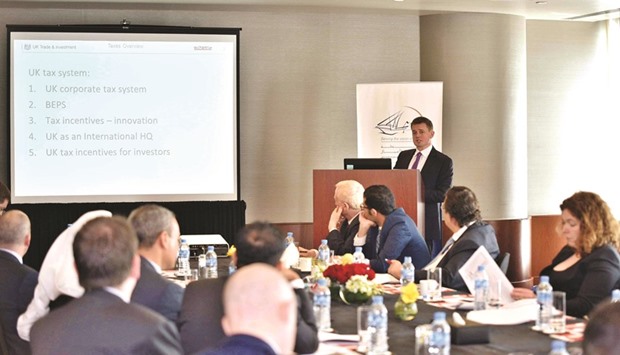The Qatari Businessmen Association (QBA) has recently organised the “UK Tax Seminar,” in co-operation with the British embassy as part of its continuous activities to deliver high-level services to the Qatari business community.
The event is also part of QBA’s series of seminars and roundtables that aim to present and discuss various topics that would be of interest to all businessmen.
Entitled “UK Tax Briefing Private Seminar,” the event was organised in co-operation with the UK Trade and Investment Authority where an expert from Charles Russell Speechlys presented the UK taxation system and covered several key areas of interest such as the UK tax for personal and business investments, the latest UK residential property taxation, and how to set up business in the UK.
Piers Master, a partner at international law firm Charles Russell Speechlys, spoke about the UK tax rules governing investment into UK residential property by individuals from Qatar.
He explained all the main taxes (stamp duty land tax, capital gains tax, inheritance tax, income tax, and the annual tax on enveloped dwellings) and noted that although the rules have changed over the past few years and in some cases are now less favourable, with proper planning it is still possible to invest in the UK residential property, both as holiday homes and as a rental investment, in a tax efficient way.
He said it is important to structure properly at the outset since it can be harder to make an inefficient ownership structure tax efficient after purchase. Master also drew attention to the proposal to extend inheritance tax to residential property held by non-UK companies from April 2017. The new rules are not yet finalised and further details are awaited from the UK government. But if they do come into force next year as expected, Master explained that it will be important for anyone with such a structure to review it to see if a company is still appropriate.
Each case will turn on its own facts but what is certain is that structures will need to be reviewed, ideally in the course of 2016, but not until the new proposals have been clarified, he noted.
Master also spoke about rules governing when an individual becomes a tax resident in the UK. This is important because non-UK residents are exposed to fewer UK taxes than UK residents, he said.
He said it is possible to become a UK resident and live in the UK tax efficiently, but advanced planning in the tax year before arrival is normally required.
Master stressed that generalisation is dangerous and no two cases are the same but by way of guidance, a Qatari individual who has never been a UK tax resident in the past, who does no work in the UK, has no UK resident immediate family, but has a place to live available in the UK, could generally spend up to 120 midnights in the UK per UK tax year (6 April to 5 April). He stressed that 90 midnights would be even safer in most cases.
For his part, Julian Christmas from the UK Trade & Investment Authority introduced the UK corporate tax system, saying it is a very simple one since it provides an internationally competitive rate of tax, and is investor friendly.
He also said the incentives that are available for companies involved in creating and exploiting new technologies, and also for individuals who invest in early stage. He also said the UK’s headline rate or corporate tax is currently 20%, the joint lowest rate of the G20 economies, and it will be reduced to 19% in 2017 and 18% in 2020.

Participants listen to various topics on taxation during the QBA’s UK tax seminar held in co-operation with the British embassy.
